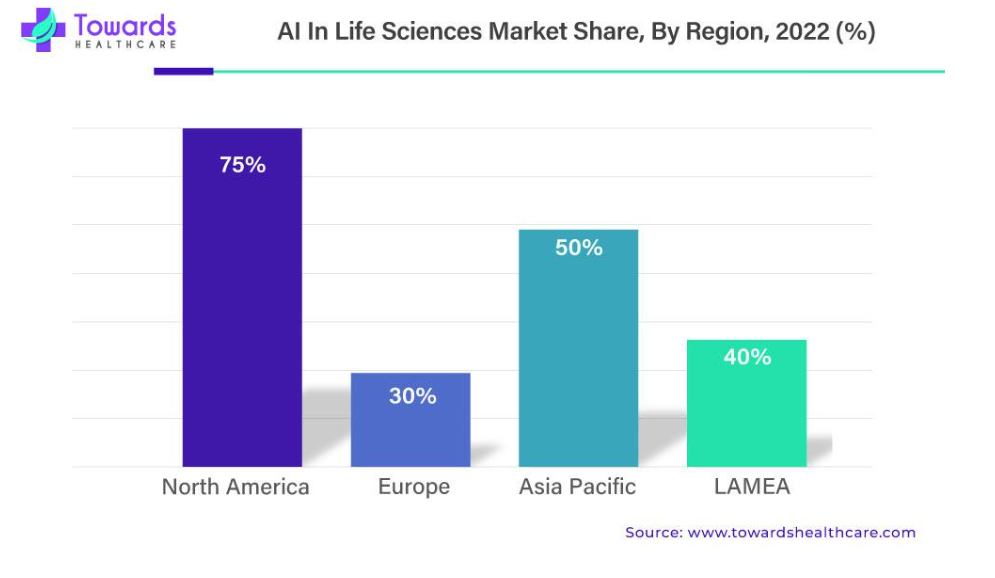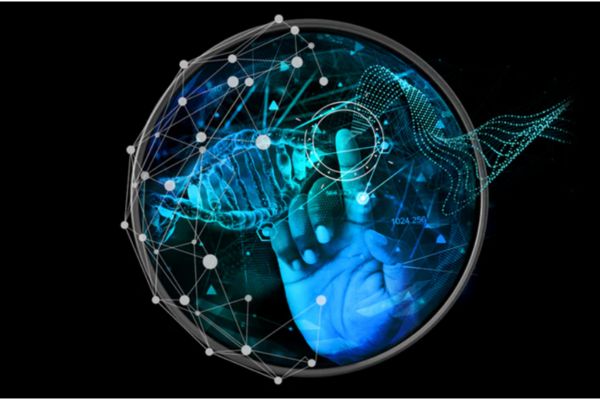The global artificial intelligence in life sciences industry has witnessed a remarkable surge in recent years, with its size estimated at USD 1.56 billion in 2022. This growth is expected to continue exponentially, reaching around USD 9.80 billion by 2032, with a registered CAGR of 20.21% from 2023 to 2032.
Such a profound expansion in the industry reflects the significant impact of artificial intelligence (AI) technologies in revolutionizing various aspects of the life sciences sector.

In the heart of bustling laboratories, where scientists meticulously analyze petri dishes and scrutinize data, a quiet revolution is taking place. It’s the convergence of two powerful worlds: artificial intelligence and life sciences. This fusion is not only reshaping the landscape of scientific research but also holds the promise of transforming healthcare as we know it.
At the core of this revolution lies machine learning, a technology so profound that it has become the linchpin of AI’s impact on the life sciences industry. Through machine learning, vast amounts of biological data are analyzed, patterns are detected, and breakthroughs are made. Imagine a world where clinical records seamlessly integrate with genomic data, where diagnoses are accurate and personalized, and where drug targets are identified with unprecedented efficiency. This is the world that AI is building.
But with great innovation comes great responsibility. As AI blazes a trail through the life sciences, it encounters hurdles, both regulatory and technical. Regulatory challenges loom large, as ensuring the safety and quality of AI-designed products and therapies becomes paramount. Additionally, the protection of intellectual property rights in the realm of AI technology is a pressing concern. It’s a delicate balancing act between fostering innovation and preserving rights.
Despite these challenges, the opportunities are boundless. The demand for AI in the life sciences industry is soaring, driven by the need to control costs and improve efficiencies in drug discovery and clinical trials. With the rise of data-driven AI and technological advances in deep learning, the possibilities are endless. From revolutionizing drug discovery to advancing personalized medicine, AI is opening doors that were once thought impossible to unlock.
The recent COVID-19 pandemic has further underscored the importance of AI in the life sciences. While many industries grappled with disruptions, healthcare and pharmacy surged ahead. Investment in research and development for COVID-19 treatments soared, benefiting from the capabilities of AI to expedite drug development and clinical trials.
Segmental Outlook
Segment by segment, the AI in life sciences industry is thriving. Software, hardware, and services each play a vital role in driving innovation forward. Software, in particular, dominates the industry, fueled by the increasing demand for data management and analytics in drug discovery and clinical trials. Services, on the other hand, are poised for rapid growth as the need for expertise in operating AI systems continues to rise.
The deployment of AI in the life sciences industry spans both on-premise and cloud solutions. The cloud segment, in particular, holds a significant share, driven by factors such as increasing internet penetration and the ease of operation associated with cloud-based servers. As the industry marches forward, the cloud is poised to become the fastest-growing segment, supported by investments in digital technology adoption.
Applications of AI in the life sciences industry are diverse, ranging from medical diagnosis to drug discovery. The drug discovery segment reigns supreme, fueled by the rising demand for treatments for chronic and gene-related disorders. Meanwhile, clinical trials present a vast opportunity, driven by the increasing volume of data generated and the adoption of AI-based software by research institutions.
North America to Soar AI in the Life Sciences Industry
In the global landscape, North America stands at the forefront of AI in the life sciences industry. With the United States leading the charge, fueled by investments from pharmaceutical and biotech giants, the region dominates the market. However, Asia Pacific is on the rise, fueled by increasing investments in AI software and hardware to enhance operational efficiency.

Market participants are constantly striving to push the boundaries of innovation. From IBM Corporation to Atomwise Inc., these players are driving research and development to maintain their market positions. Collaborations and strategic partnerships are formed, further propelling the industry forward.
Key Developments
In September 2020, Pharmaspectra and IBM Watson Health joined forces to streamline IBM’s product portfolio, enhancing digital transformation in the life sciences. Similarly, NuMedii Inc. launched the world’s first atlas of single-cell sequencing for idiopathic pulmonary fibrosis, leveraging AI to advance research. The University of Kentucky partnered with Atomwise to investigate potential therapies for COVID-19, harnessing AI for drug discovery.














